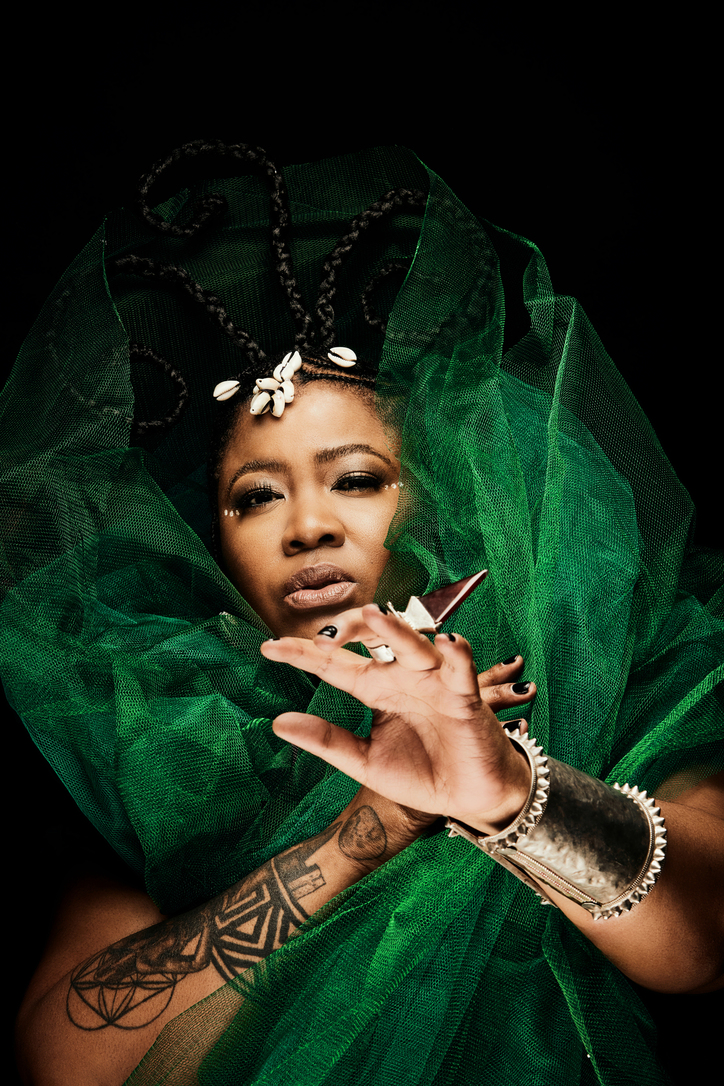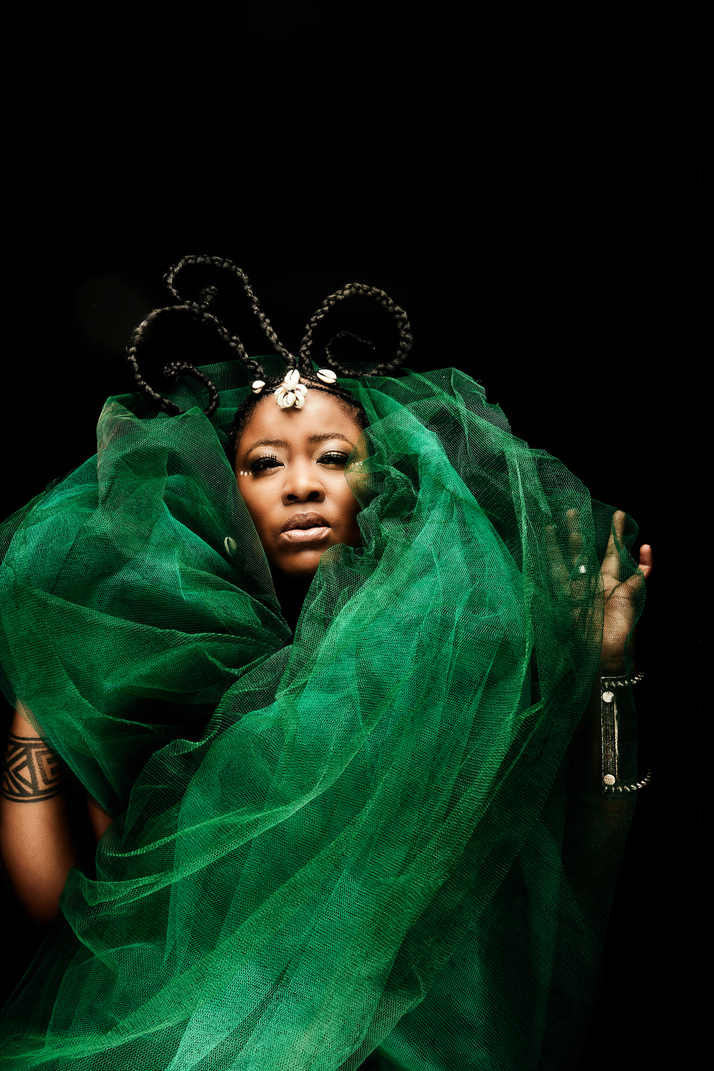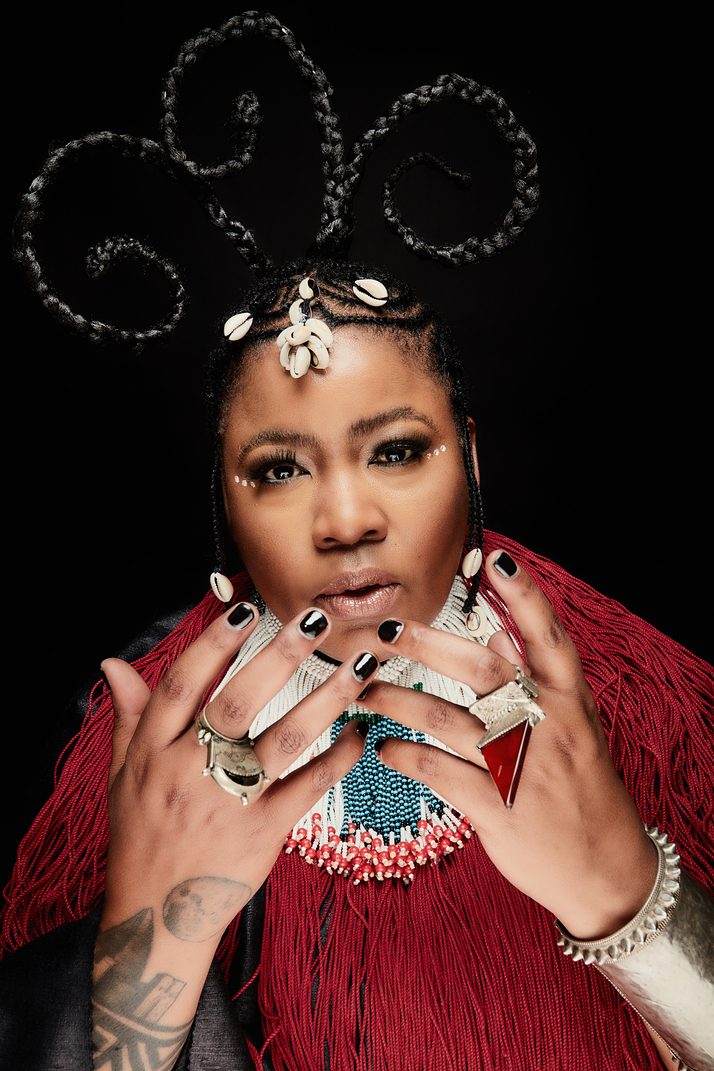I had the overwhelming honour of meeting Thandiswa Mazwai at her impeccable Simmonds Street studio in downtown Johannesburg, where we discussed her latest album release Sankofa. As the afternoon sun poured in through her large industrial windows, we sat comfortably at the far end of the space in the kind of close communion that can only be shared between a King and her valued subjects. Our reverent yet playful conversation captured a nuanced inquiry into kinghood, transgression, and the power of self-naming.
When I passingly referred to her iconic status, Mazwai deferred. I asked, “Is it offensive if I refer to you in that way?” to which she responded, “I’m hearing it a lot right now, which means there must be some truth to it. But … I’m not sure. I’m not used to it yet.” At first, she even jokingly refers to herself as a “spaz”, suggesting that she doesn’t take herself so seriously, but then swiftly remembers who tf she is. She recalls, “When I was growing up, my dad used to say humility was not a strong trait of the Mazwai family.“
“What about King Tha?”, I asked, curious about this striking confluence of modesty and self-affirmation. Assertively, Mazwai responded, “It’s about subverting ideas of gender and using words that make people uncomfortable, especially when women use them. ‘King’ has this connotation of being the absolute pinnacle. It’s like, you know, a king has a queen, but the queen is a little bit on the side. … but the king is still the king. So … it was like one of those hip-hop moments that I had where I was like, you know what, all these bitches are my sons!

Mazwai reflected on the power of words and names, asserting, “They can call me a slut. They can call me a bitch. They can call me a diva. … They can call me empress, … that thing over there, they can call me whatever they want to call me. As a woman, I take it because I know that whatever is being thrown at me is usually how that person sees themselves in relation to me. I’m good with whatever you’re throwing at me, but what you will do is you will call me King. And you will bow. Thank you very much.”
King Tha, is a deliberate statement of identity and boundaries, where others can address her with a certain level of familiarity but she maintains a sense of authority. “I remember when I was a kid, in the industry, I used to get so shocked by that, like, who’s calling me? They’re calling me like they know me. … My first stage name was Red because I was like, if you say Red, I’ll know what you’re doing. … if you say Thandiswa, I’ll think maybe you’re someone who knows me. So, the whole King Tha thing was also about that.”
But with Zabalaza, Mazwai’s iconic debut solo album, celebrating its 20th anniversary this year, marking three decades of her presence as a household name, I asked, “This makes me curious because you have a strong fandom that has this energy of, ‘This is our person’ … the way that you perform, you also give that energy. Of belonging and oneness. So how do you balance that? Being a professional, being kind of a legend, but also feeling like you’re an intimate part of the community?”

Mazwai responded, “I don’t know how we balanced that, guys. It’s a thing we did together, I think, over time where people come to my show, they cry, but then they also feel held. We are together in this thing that we’re doing at that moment. And I’m acutely aware of that, of the fact that this is like a once-in-a-lifetime moment that we’re having together in this room. We’re never gonna repeat this. So I try to, like, bring my full self into it. To every performance, because I know that. It’s kind of a gift. It’s just something that happens.”
I agreed and said, “I think you’re so good at it, and it’s so amazing to see different performances of yours because they’re never the same. Your music is so deeply embedded in Africaness and yet you are a rock star!” Mazwai responded, “It’s because of all the work I’ve done. Initially, I was just trying to impress my mother … It was a beautiful thing, but it started to feel limiting. So it’s about transgressing and I use these other spaces, like when I do these gigs with the BLK JKS, to be my fullest self.
Cause I’m not just a good girl, I’m also a bad girl, I’m also a rude girl, I’m also a, you know, a slut, a bit. I’m all these things. When I see a woman like Winnie Mandela or Brenda Fassie, for instance, I don’t think of her only in this one-dimensional way. … But then I also feel like, why is that a separate genre from my Africanness? You know, like, I don’t see the difference. … I remember someone saying, ‘I didn’t know Thandiswa was a lesbian. You really can’t tell from her music.’ What? What does that mean? I had so much fun saying to this guy, ‘Oh, you didn’t know that Nizalwa Ngobani is gay? It’s gay as fuck!’”

At some point we discussed her fashion choices, which speak volumes to her status as a queer icon, advocating for gender and sexual minorities. Mazwai recalled, “We did a gig at the Bassline, and I was in Shibari, sometimes … I’ve got my tits out. I even brought a stripper … for some people, you still look at them in the audience and they’re still having a spiritual experience. Honestly, it’s in the same thing.” Throughout our conversation, Mazwai reiterated this transgressive and transdisciplinary approach and the power of deviance.
As our pleasurable exchange drew to a close, I asked Mazwai about the future and she reflected, “… for the longest time in my career, people would ask, ‘Are you going to write English songs?’ And I’d say no because I was focused on the fact that my work could live in this little corner of the world because that was my corner. But now I’m like, “Hey, what’s up, America?” … We’re here in Africa doing African things, with African people, for African reasons … I’ve always been touring all over the world, but I prefer it this way because now I can do it without the hustle. … I like how everything is about divine timing.”
Given her impactful legacy in South African music, Mazwai’s forthcoming album Sankofa, slated for release on May 10, 2024, carries immense anticipation. Touring in Johannesburg, Durban, and Cape Town, the electrifyingly transcendent live performances are set to sweep through the country and indeed the globe as seen in her recent Tiny Desk appearance, which has gained over half a million views. Featuring collaborations with the likes of Meshell Ndegeocello and Nduduzo Makhathini, Sankofa’s blend of Xhosa traditions, jazz, and West African rhythms is an unrelenting reminder of Mazwai’s enduring reign of musical mastery.
The album can be pre-saved here.
ALBUM LAUNCH – CARNIVAL CITY
11 May 2024, 8 pm
Tickets 350-1000
Tickets here.
DURBAN PLAYHOUSE
31 May 2024, 8 pm
Tickets 350-600
Tickets here.
ARTSCAPE CAPE TOWN
20 July 2024, 8 pm
Tickets 350-600
Tickets here.



















































